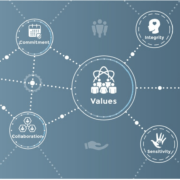The Nonprofit MBA Podcast
What Nonprofits Need to Know to Breeze through Annual Audits Featuring Jason Kruger on The Nonprofit MBA Podcast
Read the Executive Summary or Listen to the Podcast HERE: What Nonprofits Need to Know to Breeze through Annual Audits
Annual audits offer numerous benefits for nonprofits, including improved financial accountability, enhanced internal controls, compliance with legal requirements, increased donor confidence, informed decision-making, and positive public perception. By conducting regular audits, nonprofits can foster their mission, maintain transparency, and effectively manage their financial resources to serve their communities. In today’s podcast, Jason Kruger from Signature Analytics and Stephen Halasnik from Financing Solutions, a great provider of nonprofit lines of credit, discuss what nonprofits need to know to breeze through the annual audits.
About Jason Kruger from Signature Analytics
On today’s episode, we have the pleasure of speaking with Jason Kruger, the President and Founder of Signature Analytics. Jason is shaking up the way business owners run their businesses by highlighting the gaps in data and reporting that many business owners face and sharing insights on how to improve profitability, increase productivity and run your company smarter. Jason has 20+ years of experience in the accounting and business advisory field working with mid-market companies and nonprofits. Join us as we share actionable insights and strategies to help you run your Organization smarter
About Stephen Halasnik, The Nonprofit MBA Podcast, and Financing Solutions
Stephen Halasnik co-founded Financing Solutions, the leading provider of lines of credit for nonprofits and church financing. The credit line program for nonprofits & churches is fast, easy, inexpensive, and costs nothing to set up, making it a great backup plan when cash flow is temporarily down. Mr. Halasnik is also the host of the popular, Nonprofit MBA Podcast. The podcast brings experts to discuss fundraising, nonprofit grants, executive director leadership, nonprofit boards, and other important topics. You can learn more about the nonprofit line of credit program here or call 862-207-4118.
Understanding Annual Audits for Nonprofits
Annual audits play a pivotal role for nonprofits by fostering improved financial responsibility, bolstering internal controls, ensuring legal compliance, boosting donor trust, aiding informed decision-making, and fostering a positive public image.
While legal obligations might drive some nonprofits to conduct annual audits, the broader reason lies in promoting transparency, reliability, and trust with stakeholders. Given the potentially overwhelming nature of the audit process, nonprofits can benefit immensely from a deeper understanding of the key aspects of annual audits.
Why Are Nonprofits Audited?
Nonprofit entities prioritize public interests over personal profits. As a result, they largely depend on donations, grants, and other philanthropic funds. Audits, conducted by independent professionals, ensure these organizations are transparent, accountable, and compliant with pertinent legal standards. Key focus areas for these audits include:
- Financial Responsibility: Audits confirm the authenticity of financial statements, shedding light on the organization’s income, expenses, assets, and liabilities. Such rigorous examination of financial records assures stakeholders of the diligent management of funds and that the organization’s financial dealings align with relevant accounting norms and laws.
- Regulatory Compliance: Annual audits inspect if nonprofits adhere to a myriad of regulatory standards, including state and federal regulations. This reinforces the nonprofit’s commitment to legal compliance and accountability.
- Strengthening Internal Controls: Audits scrutinize a nonprofit’s internal control measures, encompassing financial administration, governance, and risk management protocols. These evaluations help pinpoint and remedy any control shortcomings, fortifying the institution against fraud or mismanagement.
- Building Donor Confidence: Transparent financial operations and independent audits amplify an organization’s credibility, assuring donors and stakeholders of its commitment to the intended charitable causes. This boosts the organization’s image, inviting increased backing and resources.
- Board Oversight: Board members, responsible for steering the nonprofit, rely on audits to gain insights into the organization’s financial well-being, pinpoint areas of improvement, and guide the organization’s trajectory.
Nonprofit Audit Types
Different audits cater to distinct organizational needs:
- Financial Audit: A comprehensive review of an organization’s financial statements to verify their accuracy and legal compliance.
- Internal Audit: Undertaken by internal teams, these focus on the efficacy of internal controls and compliance with in-house policies.
- External Audit: Independent CPAs or audit agencies carry out these assessments to vouch for the credibility of an organization’s financial reports.
- Compliance Audit: A scrutiny of an organization’s adherence to specific legal, regulatory, or industry benchmarks.
- Operational Audit: This centers on evaluating the efficiency and effectiveness of an organization’s day-to-day operations.
How To Streamline the Audit Process for Nonprofits
Achieving hassle-free audits is possible with a deeper understanding of the following aspects:
- Stay Abreast with Audit Norms: Stay updated with financial reporting protocols like GAAP or IFRS. This knowledge is instrumental in readying your organization for an audit.
- Keep Flawless Financial Records: A robust record of all financial operations forms the bedrock of successful audits. Employ suitable accounting tools to maintain these records and perform routine reconciliations.
- Adopt Rigorous Internal Controls: Implement a robust control framework to stave off financial discrepancies. Divide financial responsibilities among different individuals to introduce checks and balances.
- Regular In-house Assessments: Periodic internal checks can preempt potential audit challenges by detecting financial irregularities early on.
- Select the Right Auditor: Partner with a seasoned auditor familiar with nonprofit intricacies. It’s crucial that they resonate with your organization’s ethos.
- Assemble Essential Documents: Compile pertinent financial documents systematically to ensure the audit proceeds without hitches.
- Maintain Transparent Dialogue with Auditors: Engage in candid interactions with auditors. Furnish requisite information and address their inquiries promptly to ensure a smooth audit journey.
- Glean Insights from Audit Outcomes: Use audit findings as a learning curve. Understand the recommendations and refine your organization’s financial protocols, reinforcing its financial soundness and diminishing future audit challenges.









